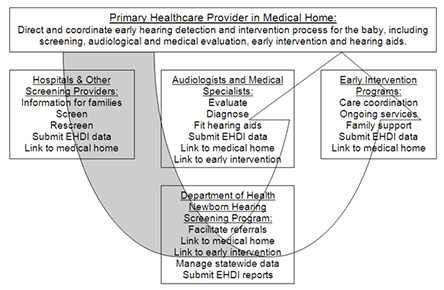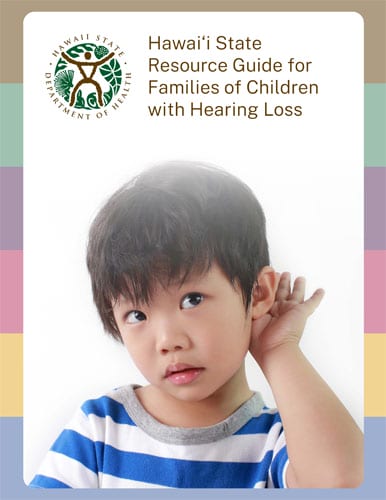Overview of Early Hearing Detection and Intervention (EHDI)
Early Hearing Detection and Intervention (EHDI) is a national initiative to detect all individuals with hearing loss and enroll them in appropriate intervention services as early as possible. Each state has its own EHDI program to implement the 1-3-6 plan:
- Screening before age 1 month
- Diagnostic evaluation before age 3 months
- Early Intervention before age 6 months
Significant hearing loss is one of the most common disorders present at birth, affecting 1-3 per 1000 newborns in the well-baby nursery and 20-40 per 1000 in the neonatal intensive care unit. In the United States, 4000 to 8000 children are born with permanent hearing loss every year.
Hearing loss is easy to miss without testing, and unidentified hearing loss can negatively impact speech and language development, academic achievement, and social and emotional development. These adverse effects can be mitigated through early intervention.
To increase detection and early intervention rates, universal newborn hearing screening was introduced across the United States in the 1990s. Newborn hearing screening is now recommended for all children by the United States Preventative Services Task Force.
The Joint Committee on Infant Hearing (JCIH) has set goals that 100% of all newborns in the United States will receive hearing screening by 1 month of age, will have an appropriate diagnostic audiology evaluation by 3 months of age, and will be enrolled in appropriate early intervention services by 6 months of age. One of the Healthy People 2020 goals is to increase the proportion of newborns who are achieving these three goals.
Primary healthcare providers, birthing hospitals, audiologists, medical specialists, early intervention programs, and departments of health all have different roles to play within EHDI.

EHDI Flowchart Long Description – PDF Format

 Resource Guide for Families of Children with Hearing Loss (Coming Soon)
Resource Guide for Families of Children with Hearing Loss (Coming Soon)